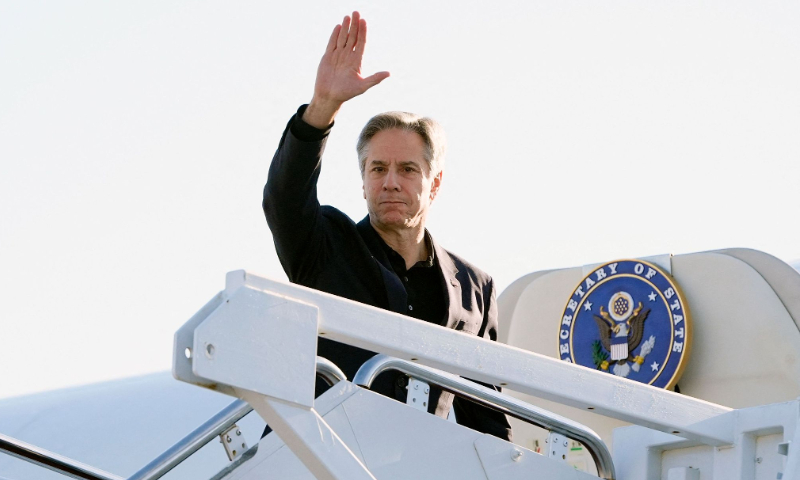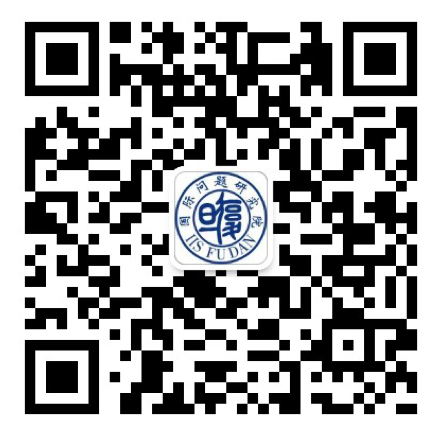
US Secretary of State Antony Blinken waves as he boards his plane at Joint Base Andrews in Maryland, on April 23, 2024, on his way to Beijing. Photo: VCG
US Secretary of State Antony Blinken arrived in Shanghai on Wednesday afternoon to begin the second official visit to China of his tenure. Some Chinese experts said whether this visit, which shows Washington's eagerness to cooperate with China, can achieve a breakthrough depends on the US' mind-set and attitude.
But given that the US continues to send signals of pressuring for demands, experts hold low expectations for a positive outcome from Blinken's ongoing China visit.
Blinken is scheduled to travel to China from Wednesday to Friday where he will meet with senior Chinese officials in both Shanghai and Beijing to talk about a range of bilateral, regional and global issues, according to a statement issued by the US State Department earlier.
Some Western media also hold a cautious view of this visit. The New York Times said Blinken goes to China with potential trouble on horizon as the visit comes as Democrats and Republicans are vying to appear tougher on China. Reuters said Blinken arrived with bilateral ties on a steadier footing, but with a daunting array of unresolved issues threatening the stability of relations between the two countries.
The Associated Press also listed the major divisions between China and the US and key issues that Blinken is going to bring up on the trip including the Russia-Ukraine conflict, tensions in the Middle East, the Taiwan question and the South China Sea issue.
Just before Blinken boarded his plane, the North America and Oceania department of China's Ministry of Foreign Affairs briefed the media on Monday, providing a 3,000-plus-word statement about the details of the visit.
It not only reiterated a welcoming attitude but also elaborately outlined the five main objectives of the visit, including establishing correct perceptions, enhancing dialogue, effectively managing differences, advancing mutually beneficial cooperation, and jointly undertaking the responsibilities of a major country.
The briefing is also considered a negotiating memorandum provided to Blinken, experts said.
There is a gap in attitudes between China and the US, which relates to the ways and ideas both sides take to handle bilateral relations, Wu Xinbo, director of the Center for American Studies at Fudan University, told the Global Times on Wednesday.
The fundamental approach of the US is to view China as its most significant strategic competitor and its most severe geopolitical challenge, so the US adopts measures to contain and suppress China under the guise of containment, while simultaneously it needs China to cooperate as well as make concessions on a range of issues important to the US, Wu noted.
On one hand, the US wants to suppress and guard against China, and on the other, it expects China to dance to its tune, Wu said.
Despite this gap in attitudes between the two countries, for the Biden administration, with the continuing increase in uncertainties in Ukraine and the Middle East, the US can no longer afford to divert attention to potential frictions and conflicts in the Asia-Pacific region, which might consume even more energy and resources, some experts said.
Under the Biden administration's strategy of maintaining communication channels through normalized and routine high-level exchanges to reduce miscalculations and prevent uncontrolled competition leading to conflicts, Blinken has taken the baton from Treasury Secretary Janet Yellen to make a routine visit to China, Sun Taiyi, assistant professor of Political Science at Christopher Newport University, told the Global Times on Wednesday.
However, although a number of US high-ranking officials have been making frequent visits to China, the US continues to signal its strategy of applying pressure for its demands and seeking more favorable bargaining chips for discussions, experts said.
For instance, US Trade Representative announced a new round of Section 301 investigations into China's maritime, logistics and shipbuilding sectors, and some US officials reportedly suggested that some Chinese banks could be cut off from the global financial system. It also rallied Japan and Australia to back the Philippines in provoking confrontations in the South China Sea, and published the 2023 Country Reports on Human Rights Practices, spreading lies about China's Xinjiang and Hong Kong regions.
The US is drafting sanctions that threaten to cut some Chinese banks off from the global financial system, arming Washington's top envoy with diplomatic leverage that officials hope will stop Beijing's commercial support of Russia's military production, according to people familiar with the matter.
Most lately, the US Senate passed a TikTok divestment-or-ban bill late on Tuesday and also passed a sweeping foreign aid package which includes arms support for the island of Taiwan.
I think there are some risk factors in the future US-China relations. One is the Taiwan question, especially around May 20 when the island's regional leader-elect is set to assume office, Sun Chenghao, head of the US-EU program at the Center for International Security and Strategy at Tsinghua University, told the Global Times on Wednesday.
If the US acts too excessively or provocatively, I believe it could impact cross-Straits relations as well as US-China relations, Sun said.
There was a brief period of optimism and positive atmosphere following the meeting between the heads of state of the two countries in November 2023, which has now vanished given a series of negative moves by Washington lately, some experts said.
Under these circumstances, it is difficult to expect any positive progress from Blinken's visit to China. The actions of the US have made China feel that it is not a credible partner, seeking only to secure what it wants while presenting unreasonable concerns and demands for interest, Wu said.






